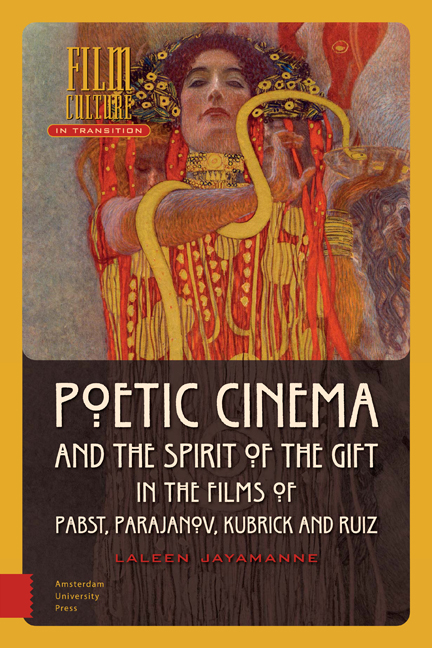Book contents
- Frontmatter
- Dedication
- Contents
- Foreword: In Memory of Thomas Elsaesser
- Introduction: Spirit of the Gift: Cinematic Reciprocity
- 1 A Gift Economy: G. W. Pabst’s Pandora’s Box (1929)
- 2 Fabric of Thought: Sergei Parajanov
- 3 Nicole Kidman in Blue Light: Stanley Kubrick’s Eyes Wide Shut (1999)
- 4 Ornamentation and Pathology: Raúl Ruiz’s Klimt (2006)
- Afterword: Poetics of Film Pedagogy
- Bibliography
- Filmography
- About the Author
- Index
2 - Fabric of Thought: Sergei Parajanov
Published online by Cambridge University Press: 13 April 2021
- Frontmatter
- Dedication
- Contents
- Foreword: In Memory of Thomas Elsaesser
- Introduction: Spirit of the Gift: Cinematic Reciprocity
- 1 A Gift Economy: G. W. Pabst’s Pandora’s Box (1929)
- 2 Fabric of Thought: Sergei Parajanov
- 3 Nicole Kidman in Blue Light: Stanley Kubrick’s Eyes Wide Shut (1999)
- 4 Ornamentation and Pathology: Raúl Ruiz’s Klimt (2006)
- Afterword: Poetics of Film Pedagogy
- Bibliography
- Filmography
- About the Author
- Index
Summary
Abstract
Parajanov is presented here as a director who composes forces of nature. The four elements – earth, fire, wind, and water, as well as stone and the nautilus shell with its unimaginable duration – figure prominently in The Color of Pomegranates. Crafted objects and woven materials play an active role in his films, while the actors aspire to the state of abstraction of the puppet. Through these means, Parajanov gives cinema a natural history and a cosmos-centric power while locating his films within a deep history of the Transcaucasia. A Sufi concept of the image and its apprehension are elaborated through a minstrel's encounter with wedding feasts of the deaf, the mute, and the blind in Ashik Kerib.
Keywords: Sergei Parajanov and Transcaucasia, Geomorphic and cosmoscentric cinema, Sufi image, Cognitive imagination, Actors and puppets
They thought up barbaric amusements
I tossed pomegranates up
And they split them with sabres!
The geological, material, and spiritual forces of the porous Transcaucasian regions of Georgia, Armenia, and Azerbaijan nourished the poetic imagination of the visionary Soviet Union director Sergei Parajanov. Born in 1924 in Georgia to Armenian parents, Parajanov's multilingual skills (in Russian, Georgian, and Armenian), along with his talents and training in music and singing, dancing and cinematography, enabled him to harness the many intersecting cultural resources of the Transcaucasia, with its deep civilizational history. Additionally, the cultural and spiritual practices of the Armenian Apostolic Church and Eastern Orthodox Christianity as well as Civilizational Islam (all religions of the Book), coexist in a unique manner in Parajanov's two major films, The Color of Pomegranates (Sayat Nova) (1969) and Ashik Kerib (1988), which are both situated within the multi-ethnic zone of Transcaucasia. Parajanov synthesized this rich variety of elements to create a singular flexible cinematic idiom. Historically, Transcaucasia was a contact zone of diverse peoples, languages, and cultures who came with the caravan trade routes (part of the Silk Road), and the Persian and Ottoman Turk invasions that introduced Islam to what was hitherto an ancient Apostolic and Orthodox Christian world. As Peter Brown says, Armenian culture ‘drew strange vigor from existing side by side with a continuing epic world or pre-Christian customs and oral tradition’. The pre-Islamic Persian influence, a legacy of war, was also an important aspect of the life of the nobility, who were ‘highly Iranized in social structure and lay culture’.
- Type
- Chapter
- Information
- Poetic Cinema and the Spirit of the Gift in the Films of Pabst, Parajanov, Kubrick and Ruiz , pp. 55 - 110Publisher: Amsterdam University PressPrint publication year: 2021



